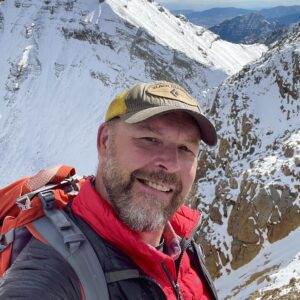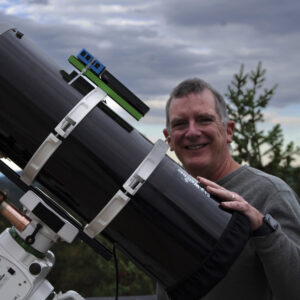Ambassadors
2022 Ambassadors
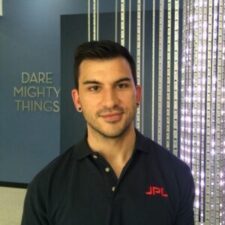
Brandon Rodriguez
Brandon Rodriguez is the Educator Professional Development Specialist at NASA’s Jet Propulsion Laboratory. With a background in chemistry, Brandon worked as a research scientist for several years, making bio-plastics for the Dow Chemical Company before finding a passion for education. He shifted his career away from the private sector and into the classroom via teaching seven years of high school and college chemistry and physics. He then extended his teaching role to preparing preservice teachers by teaching graduate-level education courses, assisting future teachers bring engaging science to their own classrooms. This led him to a position in the Education Department at JPL in Pasadena, CA. In his role, Brandon gets to live in ‘both worlds’, performing research in young stellar object formation via IR astronomy and flying on NASA’s SOFIA, while also writing curriculum and leading professional development for K-12 educators.
During his seven years at JPL and alongside his incredible team, he has conducted hundreds of workshops for students and teachers around the country, organized the televised programming for the Perseverance landing in 2021, and published dozens of classroom activities for educators everywhere.
Brandon is an avid traveler, having visited over 40 countries and all seven continents. As a loud advocate for nerd culture, his happiest moments are spent reading science fiction, watching Star Trek with his colleagues, and eagerly plotting his next Dungeons and Dragons session.
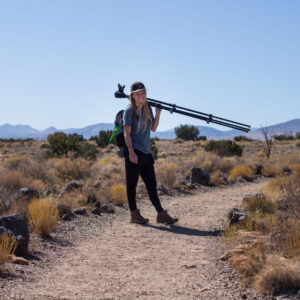
Bettymaya Foott
Bettymaya Foott loves to bring people to the dark side. As the Director of Engagement for the International Dark-Sky Association (IDA), Bettymaya works with a global community of dark sky defenders, empowering them with tools, resources, and inspiration to protect the night sky. An avid astrophotographer, you can usually find her out under the stars with one of her three cameras battling off mosquitos. Bettymaya’s photography has been featured in Sky and Telescope, National Geographic, and the Los Angeles Times. Her dark sky efforts have reached TedX Kansas City and the New York Times.
Growing up in picturesque Moab, Utah and spending summer nights sleeping on the trampoline under the stars, Bettymaya fostered an early appreciation for the night sky. Her childhood was filled with hiking, camping, boating, and wandering in the desert, both below the hot sun and under clear dark skies. She graduated from the University of Utah Honors Program with an H.B.S. in Environmental and Sustainability Studies and a Minor in Spanish Language and wrote a thesis entitled “Light pollution hazards within ecosystems and mitigation strategies for the future.” Her dark sky career began working for Utah State Parks, starting 12 International Dark Sky Park applications across the state. She then worked as Coordinator for the Colorado Plateau Dark Sky Cooperative and the Consortium for Dark Sky Studies at the University of Utah before making her way to IDA. Preserving dark skies is her life goal and she is incredibly excited to continue this journey of saving the stars!
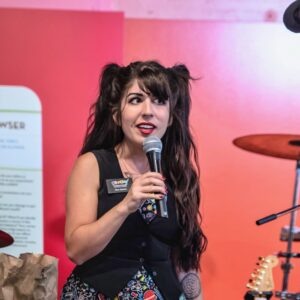
Elainie Huncik
Elainie Huncik is the Program Coordinator of Outreach at OH WOW! The Roger & Gloria Jones Children’s Center for Science & Technology in Youngstown, Ohio. She completed a Bachelor’s of Science in Physics/Astronomy with minors in Mathematics and Geosciences at Youngstown State University (YSU), where she discovered her passion for science communication through her work at YSU’s Ward Beecher Planetarium. At the planetarium, she assisted with shows, spoke in the “Keep Looking Up” livestream, assisted with the production of videos, and presented about engaging young planetarium audiences at the Great Lakes Planetarium Association conference. She was also a TA for astronomy classes, a tutor, and a recipient of the NASA/OSGC Education Scholarship. As the secretary of YSU’s chapter of Society of Physics Students (SPS), she helped with organizing events to facilitate student and public interest in physics and astronomy, which earned YSU’s chapter the Outstanding Chapter Award from SPS National. In her position at OH WOW!, she is responsible for developing activity kits that align to STEM learning standards, communicating STEM through outreach to K-12 schools, and working with community partners to coordinate enrichment programs for schools in underserved communities. She also appears on Youngstown’s local news channel every week for OH WOW!’s segment, in which she is known as “Miss Elainie” (miscellany) because she uses miscellaneous items to demonstrate science concepts. Elainie is involved in her community as a member of the Mahoning Valley Astronomical Society and the Gardeners of Greater Youngstown, and she volunteers at local community theaters. She even shares her passion for astronomy in a social setting by inviting new friends to observe at a dark sky site.
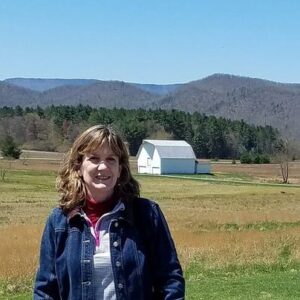
Debbie McKay
Debbie is a retired science teacher from West Virginia. During her teaching career, she and her students became involved with pulsar research at Green Bank Observatory. Through their involvement with Pulsar Search Collaboratory, their continued research was accepted for the annual American Astronomical Society conference in 2020 that took place in Honolulu, Hawaii. Debbie continued her involvement in astronomy with educational user testing for the Vera C. Rubin Telescope. She successfully completed training for the solar system through the cosmos sponsored by the Rubin Observatory and the National Earth Science Teachers Association. She is currently a HSTA teacher through West Virginia University. HSTA, or Health, Science, Technology Academy, is a one-of-a-kind mentoring program in the state of West Virginia that helps participating high school students enter and succeed in STEM-based undergraduate and graduate degree programs. She also is a teacher cohort for West Virginia’s Climate Change Professional Development through Fairmont State University. Debbie recently took part in a workshop for publishing best practices in STEM held at Green Bank Observatory. She is on an advisory board for an environmental center in Wheeling, WV and is also a member of their DEIA committee. Her love of science extends from the natural sciences on earth through the cosmos of space. In her spare time, she enjoys swimming, kayaking, and fly fishing with her husband, and spending time with her horses.
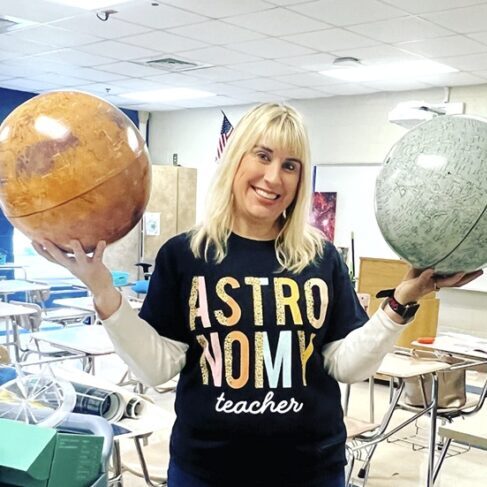
Denise Wright
Denise Wright is a STEM Educator in Myrtle Beach, South Carolina. She is passionate about public outreach and volunteers for NASA as a Solar System Ambassador. Denise was one of the first teachers in her state to use a historic 1926 12 ⅜ Alvan Clark Refracting telescope, in K12 Distance Learning environment with the South Carolina State Museum. She is a member of the IAU Astronomy Educator’s Team for the United States, National Science Teaching Association, Astronomical Society of the Pacific, and the International Society of Technology Education. She was one of the founders of her local amateur astronomy group, Grand Strand Astronomers and she created AstroSTEM club which exposes students to STEM, astronomy, and coding. AstroSTEM has participated in the academic STEM competition, Ecybermission, sponsored by the Army Education Outreach Program, and has ranked as National Finalists in 2021 and 2022. She has written many educational STEM grants, enjoys infusing technology into her classroom, and has written several journal articles for the National Science Teachers Association, Science Scope Magazine. Denise has presented at K12 space education conferences for teacher professional development, throughout the United States and internationally (Space Educator’s Explorers, National Science Teaching Association, Shaw-IAU Workshop for Astronomy Education, and Astronomical Society of the Pacific) . She has received awards for her excellence in teaching from the National STEM Scholars Program, Computer Science Technology Association, and was a former nominee for National Online Teacher of the Year. She is honored to be a part of the ACEAP team!
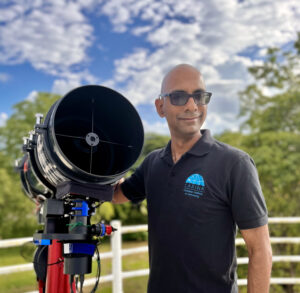
Isa Mohammed
Isa Mohammed is an amateur astronomer, engineer and entrepreneur residing in Trinidad and Tobago. He has had a long and fascinating relationship with Astronomy over the course of his life. The current President of the Caribbean Institute of Astronomy (CARINA), Mr. Mohammed developed a passion for the field in 1997 when he first viewed comet Hale-Bopp from his backyard at the age of 13. By 2001, he went on to become President of the Astronomy Club at Presentation College, Chaguanas. In 2003, while a Computer and Electrical Engineering student at The University of The West Indies, he became heavily involved with CARINA after attending the inaugural CARINA Star Party. He served in various capacities at CARINA, including coordination of the International Year of Astronomy 2009 campaign in Trinidad and Tobago, before being elected President of the group in 2011. He has seen CARINA through numerous activities including Star Parties, observing the 2012 Transit of Venus and 2017 total solar eclipse, and numerous astronomy outreach and education activities, lectures, workshops and conferences throughout Trinidad and Tobago, and the English-Speaking Caribbean. Mr. Mohammed has also had an ongoing working relationship with The University of the West Indies, participating in several of their astronomy related programs, including the comet 67/P observation project and the IAU’s 2019 NameExoWorlds campaign. He was notably involved in the coordination of two major regional conferences- the UWI/CARINA Astronomy Conference 2017 and the William Hrudey Caribbean Astronomy Conference in 2018. Mr. Mohammed currently lives in Chaguanas, Trinidad with his wife and three children.
David Thesenga
David Thesenga has been teaching physics, chemistry, and the earth/space sciences for 22 years to both middle- and high-school students in Pasadena, New York, Chicago, and Boulder, Colorado. Hiking into the remote wildernesses of North America has afforded him with opportunities to wonder at the night sky. A 2018 NAGT Outstanding Earth Science Educator, that childhood wonder is translated to his classroom subjects by teaching through the lens of astronomy, solar system exploration, and exobiology to excite and engage students. With an original interest in glaciology, David earned his BS in Geology/Geophysics from the University of Alaska Fairbanks and shifted to the mining industry in Cripple Creek, Colorado. After leaving mining, he earned his Masters of Science in Teaching from Boston College and never looked back. He has been a curriculum developer for the 7-10 Project of the California PreCollege Science Initiative (CAPSI) at the California Institute of Technology, a faculty associate for math and science teacher preparation at Claremont Graduate University, and a past-editor of The Earth Scientist, the journal of the National Earth Science Teachers Association. He was named an Albert Einstein Distinguished Educator and worked for the National Science Foundation in the Directorate of Geosciences focusing on 3D printing of topographical concepts and assisting in the reimagining of the GLOBE program’s teacher professional development and, most recently, a PolarTREC teacher/researcher working to understand glacial flow dynamics within the shear zone of Antarctica’s Ross Ice Shelf.
Frank Turina
Frank Turina is an astrophotographer and night sky advocate based in Evergreen, Colorado. Frank spent more than 15 years working for the National Park Service Night Skies Program, helping to provide park visitors with opportunities to experience the vastness and beauty of the night sky and naturally dark environments. He also helped protect wildlife and other natural and cultural resources from the effects of light pollution. This position included numerous opportunities to educate the public on the night sky protection through publications, presentations, and lectures in a variety of settings, including providing narration for a planetarium program. Frank earned a PhD in Environmental Policy from University of Colorado and currently serves as an adjunct faculty member at the University of Denver’s Environmental Policy and Management Program. Frank started his journey in astrophotography in 2018 to better understand how light pollution affects astronomers and others interested in enjoying naturally dark places and he currently manages the Night Sky Resource Center website. The goal of this website is to inspire interest in astronomy and appreciation of the night sky, and to provide information about threats to this magnificent resource. The website showcases his astrophotography and examines the ecological and cultural effects of light pollution. It also provides advice, strategies, and ruminations on protecting night skies.
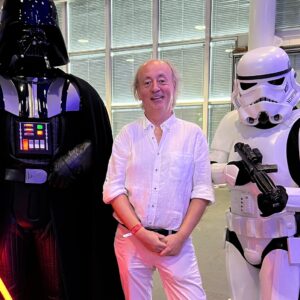
Matthias Matting
Matthias Matting is an author and science journalist from Germany. The first thing he can consciously remember was people in strange suits stomping around on the moon. Since then, he has been so drawn to space that he would have loved to become an astronaut. That didn’t work out- at least not yet. So Matthias first studied physics and graduated with a diploma, then he started to bring the fascination of science to other people as a science journalist and author. As a journalist, he oversees the German-language edition of the popular space magazine ALL ABOUT SPACE. For research purposes, he has, among other things,participated in a simulated Mars landing in the desert of Oman, experienced weightlessness on board a research aircraft or visited the European space port in French Guyana. The physicist gives lectures on cosmology and astronomy at trade shows and comic cons and other events. In 2020, he started a part-time additional education to become a “Master of Space Science” at the International Space University (ISU). As a writer, under the pen name of Brandon Q. Morris, he publishes award-winning hard science fiction novels with a focus on accurately portrayed science that have sold millions of copies and are published worldwide in six languages. At night, he observes the sky with his own telescope. At his own space blog, hard-sf.com, he regularly writes about new scientific discoveries by astronomers world-wide. He is a member of the Mars Society and the Science Fiction and Fantasy Writers Association (SFWA). Matthias speaks English, Spanish, French, and his native language, German.
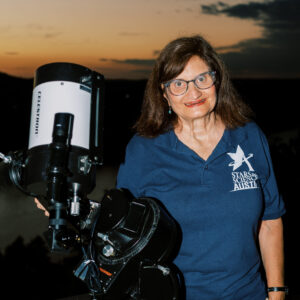
Lucia Brimer
Lucia Brimer is co-founder and science educator for Stars and Science Austin, based in Austin, TX. She runs mobile planetarium shows, hands-on science activities, and evening stargazing sessions at K-12 schools, preschools, libraries, churches, summer camps, and community events throughout Central Texas. She began many of these programs in 2010 with the Austin Planetarium and the Texas Museum of Science and Technology, where she was Education Director. Recently, she founded Stars and Science Lakes Region in New Hampshire, where she is expanding the same programs throughout that state.
Lucia has degrees in physics and astronomy from Mount Holyoke College in Massachusetts, and has taken graduate courses at Johns Hopkins University and University of Maryland. She worked at Maria Mitchell Observatory on Nantucket Island, then at Harvard-Smithsonian Astrophysical Observatory, doing variable star research at both. Upon moving to Texas, she was Program Coordinator with the Texas Space Grant Consortium, coordinating the Reduced Gravity Student Flight Opportunities Program with NASA, where university students developed research projects to take aboard NASA’s KC-135 Reduced Gravity Simulator. She expanded the program to include Texas high school and community college students.
Lucia earned a secondary teaching certificate in sciences and math at Texas State University, taught science and math to 4th and 5th graders, and physics and astronomy to high school and community college students. She also developed and ran stargazing programs for the Lower Colorado River Authority parks.
Lucia’s passion is astronomy, and, especially, introducing children and the public to the wonders of astronomy and the night sky. She is honored to be part of the 2022 ACEAP Ambassadors and is looking forward to her time in Chile and her first viewing of the Southern Constellations and the Magellanic Clouds
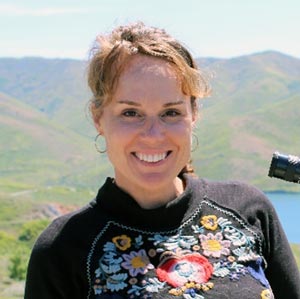
Emily Lehnardt
Emily Lehnardt first “gravitated” toward the exciting world of space exploration during a high school lecture about black holes. From that moment, she has actively pursued anything space related. As a NASA/JPL Ambassador, Emily has shared her passion of space to libraries, schools, and clubs. For example, she recently collaborated with NASA Johnson Space Center at the Utah STEM Fair which had over 14,000 students and teacher attendees. NASA featured research from her students on how space affects tomato seeds aboard the Space Station. Recently, she developed high school curriculum for the First Seed Foundation which oversees the Tomatosphere project in the US.
Not only does she share her love of space with her community, she also shares it with her students. Specifically, Emily is busy advising her after-school STEM club, leading a MESA club for 6th, 7th and 8th graders at her junior high school where she teaches 6th grade science. She also created and advised a Girl Scout STEM troop. Additionally, Emily was awarded Teacher of the Year at her school in 2017, and she recently received her NASA Endeavor STEM Leadership Certification.
The most endearing collaboration was with the Make A Wish Foundation. A young boy with cancer wished to star gaze, and he chose to come to her STEM club. He eagerly learned all about constellations that he would see in Moab, Utah. He left with a twinkle in his eye. Emily left with tears in hers.
“ACEAP has given me opportunities beyond exclusive tours of world-class observatories and incredible southern skies. Through this program, I have made connections with people that will last a lifetime.”
— Tiffany Stone, ACEAP 2018

